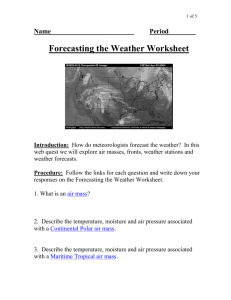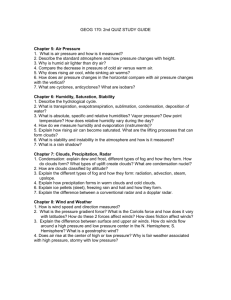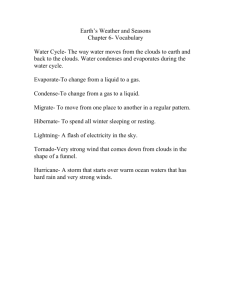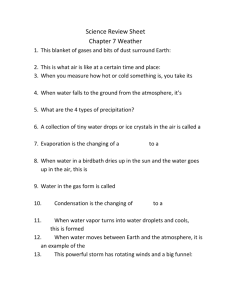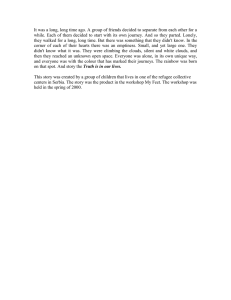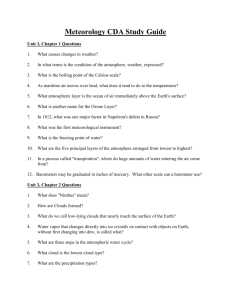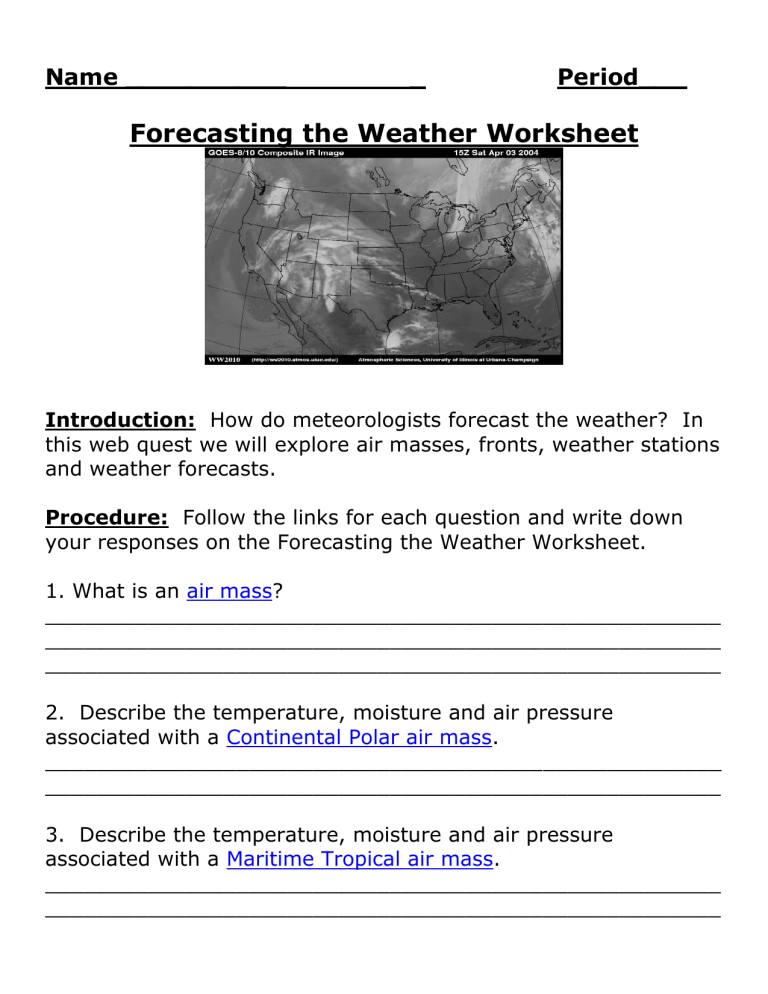
Name __________ _ Period___ Forecasting the Weather Worksheet Introduction: How do meteorologists forecast the weather? In this web quest we will explore air masses, fronts, weather stations and weather forecasts. Procedure: Follow the links for each question and write down your responses on the Forecasting the Weather Worksheet. 1. What is an air mass? _____________________________________________________ _____________________________________________________ _____________________________________________________ 2. Describe the temperature, moisture and air pressure associated with a Continental Polar air mass. _____________________________________________________ _____________________________________________________ 3. Describe the temperature, moisture and air pressure associated with a Maritime Tropical air mass. _____________________________________________________ _____________________________________________________ 4. Describe a high pressure center. What is another name for a center of high pressure? ____________________________________________________ 5. What is a cyclone? What direction do winds flow in cyclones in the Northern Hemisphere? In the Southern Hemisphere? _____________________________________________________ _____________________________________________________ _____________________________________________________ 6. Watch this animation on how winds flow around cyclones (pressure lows) and anticyclones (pressure highs) in the Northern Hemisphere. Draw and describe what you observe below. _____________________________________________________ _____________________________________________________ 7. What is the definition of a front? _____________________________________________________ _____________________________________________________ 8. Individual surface weather stations use a standard format to report date. Review the weather stations symbols for temperature, weather symbol, dew point, cloud cover, sea level pressure and wind. Draw and label the station symbol in this example. 9. What is a cold front? Describe the characteristics before, during and after a cold front below. Definition:____________________________________________ _____________________________________________________ _____________________________________________________ Before During After Winds: Winds: Winds: Temp: Temp: Temp: Clouds: Clouds: Clouds: Pressure: Pressure: Pressure: Precip: Precip: Precip: Visibility: Visibility: Visibility: Dew point: Dew point: Dew point: 10. Watch the animation of a cold front and describe the type of precipitation associated with cold front movement. _____________________________________________________ _____________________________________________________ _____________________________________________________ 11. What is a warm front? Describe the characteristics before, during and after a warm front below. Definition: ____________________________________________ _____________________________________________________ _____________________________________________________ Before During After Winds: Winds: Winds: Temp: Temp: Temp: Pressure Clouds: Pressure: Pressure: Clouds: Clouds: Clouds: Precip: Precip: Precip: Visibility: Visibility: Visibility: Dew point: Dew point: Dew point: 12. Watch the animation of a warm front and describe the type of precipitation associated with a warm front. _____________________________________________________ _____________________________________________________ _____________________________________________________ _____________________________________________________ 13. What is the importance of temperature in the formation of rain, freezing rain, sleet or snow? (draw the diagram shown with freezing rain, sleet, and snow) Rain Temps: Freezing Rain Temps: Sleet Temps: Snow Temps: 14. What is a Supercell Storm? What dangerous conditions may develop during supercell storms? What wind and cloud conditions are prevalent in supercell storms? _____________________________________________________ _____________________________________________________ _____________________________________________________ _____________________________________________________ _____________________________________________________ 15. What is the “Jet Stream” and at what altitude is the jet stream measured? _____________________________________________________ _____________________________________________________ _____________________________________________________ 16. a. Describe the “trends” method of forecasting. What factors does a meteorologist using the trends method consider? _____________________________________________________ _____________________________________________________ _____________________________________________________ b. If a line of thunderstorms is located 60 miles to your northwest and moving southeast at 30 miles per hour, how long will it take to reach your location? Show your calculation. _____________________________________________________ _____________________________________________________ _____________________________________________________ 17. What altitude do high level clouds form at? _____________________________________________________ a. From your notes – what are the names of the high level clouds? 1. _______________ 2._______________ 3.________________ b. What altitude do mid level clouds form at? _____________________________________________________ c. From your notes – what are the names of the mid level clouds? 1. _______________________ 2. _______________________ d. What altitude do low level clouds form at? _____________________________________________________ e. From your notes – what are the names of the low level clouds? 1._______________________ 2._______________________ 3._______________________ 4._______________________ 5._______________________ 18. Hurricanes are formed from thunderstorms. What 2 criteria must be met for a hurricane to develop from a thunderstorm? 1.__________________________________________ __________________________________________ 2.__________________________________________ ___________________________________________
